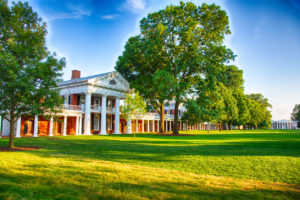
This month we travel across the country to Virginia. One of the original 13 colonies, Virginia possesses a lot of living history with the Jamestown Settlement and Colonial Williamsburg being notable historic landmarks.
The Shenandoah National Park lies in the eastern part of the state deep in the Blue Ridge Mountains. Mostly forested, the park features wetlands, waterfalls and rocky peaks, like Hawksbill, and Old Rag mountains. It is also home to many bird species, deer, squirrels and the elusive black bear.
The geography and climate of the Commonwealth are shaped by the Blue Ridge Mountains and the Chesapeake Bay, which provide habitat for much of its flora and fauna. At the Southeastern part of the state, lies Great Dismal Swamp National Wildlife refuge and the Back Bay National Wildlife Refuge.
Tourists can also flock to one of the state’s 30 national park service units, such as Great Falls Park and the Appalachian Trail, and one national park, the Shenandoah National Park. Wineries and vineyards in the Northern part of the state along the Blue Ridge Mountains also generate income and are popular attractions.
Business Climate
Virginia’s economy has many sectors: agriculture in the Shenandoah Valley, federal agencies in the northern part of the state, including the headquarters of the US Department of Defense and the Central Intelligence Agency (CIA), and military facilities in Hampton Roads, the site of the region’s main seaport. The state’s economy changed primarily from agricultural to industrial during the 1960s and 1970s. And in 2002, computer chips became the state’s leading export by monetary value.
Virginia has the highest concentration of technology workers of any state after California, Texas and New York. Computer chips became the state’s highest grossing export in 2006, surpassing its traditional top exports of coal and tobacco combined, reaching a total export value of $717 million in 2015. Northern Virginia, once considered the state’s dairy capital, now hosts software, communication technology and defense contracting companies, particularly in the Dulles Technology Corridor.
Despite the move toward technology, coal mining is still an important part of Virginia’s economic structure. Over 62 million tons of other non-fuel resources, such as slate, kyanite, sand or gravel, were also mined in 2012. The state’s carbonate rock is filled with more than 4,000 caves, which are open for tourism.
Agriculture occupies 32% of the land in Virginia. As of 2012, about 357,000 Virginian jobs were in agriculture, with over 47,000 farms. Though agriculture has declined significantly since 1960 when there were twice as many farms, it remains the largest single industry in the state. Tomatoes surpassed soy as the most profitable crop in Virginia in 2006, with peanuts and hay as other agricultural products. Although it is no longer the primary crop, Virginia is still the fifth-largest producer of tobacco nationwide.
Tax Climate
Virginia collects personal income tax in five income brackets, ranging from 3% to 5.75%. The state’s property tax is set and collected at the local government level and varies throughout the Commonwealth. Real estate is taxed at the local level based on 100% of fair market value. Tangible personal property is also taxed at the local level and is based on a percentage of original cost.
In the Commonwealth, the top corporate income tax rate is a flat 6%.
Virginia levies a 5.3% state sales tax on consumers, which ranks 31st among states levying a state sales tax. The average local sales tax rate is approximately 0.33%. Therefore, the combined state and local average sales tax rate is 5.63%, which ranks 41st in the nation. There is an additional 1% local tax, for a total of 5.3% combined sales tax on most Virginia purchases and 2.5% on most food.
The state taxes gasoline at 22.33 cents per gallon, which ranks 36th highest nationally. Its cigarette tax stands at 0.30 cents per 20-pack. This ranks 49th highest nationally.
Tax Incentives and Credits
Tax credits provide incentives to support business growth and activities in Virginia. These include:
Major Business Facility Job Credit- Companies engaged in any business in the Commonwealth, except for retail trade business, may claim a Virginia Jobs Tax Credit if the taxpayer creates new full time jobs in excess of the threshold amounts established for one of the two credit tiers. A qualified major business facility may spread the credit allowed per qualified full-time employee over two taxable years. For more information on the distinction between the two tiers, click here.
Worker Retraining Tax Credit- This credit allows an employer to claim a tax credit for the training costs of providing eligible worker retraining to qualified employees for taxable years beginning on or after January 1, 1999. This credit may be applied against individual income tax, estate and trust tax, corporate income tax, bank franchise tax, and taxes imposed on insurance companies and utility companies.
For more information on these tax credits, check out the Virginia Department of Taxation. Our team at Miles Consulting Group is always available to discuss the specifics of your situation and help you navigate the complex tax structures arising from multistate operations. Call us to help you achieve the best tax efficiencies.
Random Facts:
- Virginia’s border with Tennessee was disputed at the Supreme Court Level in 1893.
- The Virginia general assembly is the oldest continuous law-making body in the New World.
- The Chesapeake Bay separates the contiguous portion of the Commonwealth from the two county peninsula of Virginia’s Eastern Shore.
- Virginia is nicknamed, “Mother of Presidents,” as eight Virginians have served as President of the United States, including four of the first five.
- Virginia has the fifth highest number of wineries in the nation.














